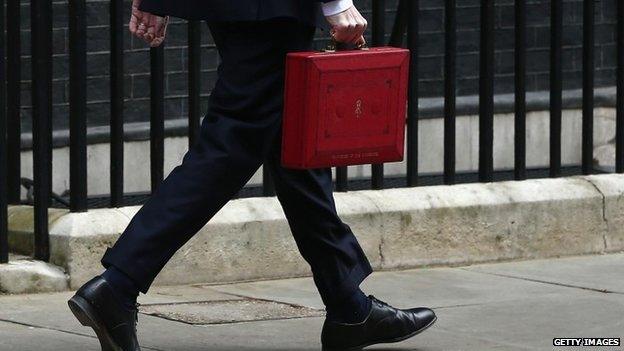IMF says UK still in deficit in 2020
- Published
- comments

The International Monetary Fund has today highlighted the challenge to be faced by the next government in returning the public finances to balance.
Its new official forecast is for the gap between spending and taxes still to be a deficit of £7bn in 2019-20, compared with the Office for Budget Responsibility's forecast made at the last budget for a surplus of £7bn.
Its gloomier projection may be seen as a particular embarrassment for the Tories, given that unlike Labour and the Liberal Democrats they are committed to generating a surplus on the overall budget.
However a small part of the forecasting difference between the IMF and the OBR is that the IMF assumes there will be a weakish minority government after the election and therefore spending will be a bit higher than the Tories' plan.
Too optimistic?
So a senior Tory put a brave face on the IMF's disagreement with the OBR and said it showed the risks of voters not giving them a clear mandate.
However that is not the whole story, in that the IMF also believes the OBR is being a bit too optimistic about growth and tax revenues in the latter years of the next parliament.
In truth therefore the IMF is highlighting that whoever leads the next government may be forced to increase taxes or cut spending a bit more than currently planned.
This may represent a bigger headache for the Tories than Labour or the LibDems given that in the last few days the Tories have committed themselves to £6bn of tax cuts and £8bn of increased spending on the NHS, without saying where the money for these giveaways would come from.
In fact just yesterday a senior Tory pointed to the OBR's projected surplus for 2019/20 and said that would cover (almost) the NHS commitment.
Well the IMF today says that £7bn surplus is a chimera.
All that said, the IMF forecast is a million miles from being devastating for any party: the difference between a £7bn deficit and £7bn surplus in 2020 is just 0.6% of GDP or national income - which is a rounding error in the context of a deficit that was a humongous 10% of GDP just five years ago.